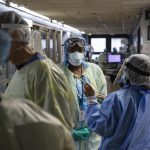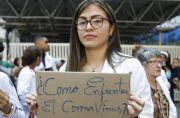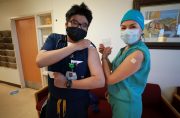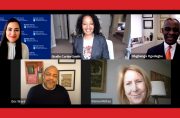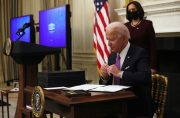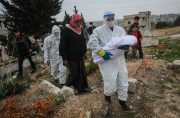Following the first confirmed case of SARS-CoV-2 (COVID-19) in December 2019 in Wuhan, China, the novel coronavirus spread rapidly around the globe. As of early 2023, there were more than 642,000,000 documented cases of COVID-19 and more than 6,600,000 deaths worldwide. As new variants appear and spread, the pandemic continues to be a deadly global public health and human rights crisis, one that has laid bare critical failures in both crisis preparedness and response and underscored the pronounced inequities in access to health care worldwide.
Since the pandemic began, PHR has supported public health advocates, health care workers, scientists, and the many others on the front lines of this pandemic calling for equity in access to health, and policy driven by science, not politics. Our 2020-2021 webinar series brought together international leaders in public health and human rights to discuss the most urgent issues arising midst the pandemic and seek rights-based responses. PHR and our global network of health care professionals are working together to strengthen the world’s response to COVID-19 and to better prepare for future pandemics.
PHR and our global network of health care professionals are working together to strengthen the world’s response to COVID-19 and to better prepare for future pandemics.
COVID-19 in the United States
The United States accounts for the highest number of deaths globally. As of the beginning of 2023, there were more than 98,600,000 confirmed cases of COVID-19, and more than 1,070,000 deaths in the United States alone. Despite having early and ample access to testing, masks, and later, highly effective and safe vaccinations, many people in the United States remain unvaccinated or inadequately vaccinated. The United States’ initial response to the coronavirus was defined by poor communication, poor public health infrastructure, rising distrust in science, and politically-charged attacks on the credibility of public health institutions.
Racism and other forms of prejudice that already affect public health in the United States have only exacerbated disparities of care during the COVID-19 crisis. Throughout the pandemic, people with disabilities, incarcerated individuals, and communities of color have faced an inequitable COVID-19 burden. PHR advocated for vaccines to be provided to all marginalized groups in the country, including Black, Indigenous, and other people of color, people in immigration, criminal, or any other form of detention, and all migrants, such as refugees, asylum seekers, and undocumented immigrants.
PHR sounded the alarm when the pandemic was exploited by politicians in order to enact harmful immigration policies. In March 2020, the Trump administration overrode the objections of public health experts at the U.S. Centers for Disease Control and Prevention (CDC) and compelled the CDC to issue an order under Title 42 U.S.C. section 265 of the 1944 Public Health and Service Act that closed the border to migrants and asylum seekers. The government used public health as a pretext to summarily expel children and adults seeking refuge at the southern U.S. border, while at the same time allowing other types of travelers to continue to cross the border with no testing or quarantine requirements. PHR rigorously documented the harms of Title 42 on asylum seekers. Along with other public health experts and organizations, PHR continues to seek the full repeal of Title 42, using medical voices to demonstrate the lack of epidemiological evidence for keeping it in place. We continue to expose the harm that this and other racist policies causes families seeking asylum in the United States.
Violence against Health Care Workers and Mis/Disinformation
Early in the pandemic, health care professionals lacked the necessary personal protective gear, such as masks and gowns. Shortages of ventilators and other critical resources for seriously ill people compounded the crisis, and unprecedented numbers of patients who flooded hospitals had a grueling impact on communities. Some health care workers who spoke out about inadequate safety measures were punished. At times, workers were even violently attacked by the public. PHR documented the harms health care workers faced in their efforts to provide care, campaigned for adequate PPE for all health care professionals, and spoke out against attacks on medical personnel.
As the pandemic continued, science, innovation, and improved supply chains provided some relief. As vaccines and therapeutics became available, the problem shifted from a lack of resources to a lack of knowledge, communication, and trust. Many health care professionals in remote areas and low-income countries are not able to access COVID-19 therapeutics due to poor governmental communication and reduced access to global innovations.
The Fight for Global Vaccine Equity
As vaccines were rolled out in many, mostly wealthy, countries, PHR joined the call for just and equitable distribution, grounded in science, ethics, and human rights.
In April 2020, governments, civil society, scientists, and global health advocates joined together to enhance global collaboration through the Access to COVID-19 Tools Accelerator (ACT-A). The vaccine pillar, COVID-19 Vaccines Global Access or “COVAX”, focused on rapid development and equitable delivery. All participating countries, regardless of income levels, would have equal access to these vaccines once they are developed. Unfortunately, many rich nations negotiated direct deals with vaccine manufacturers to secure doses outside of COVAX, resulting in vaccine hoarding, or “vaccine nationalism.”
With our partners across the United States and around the world, PHR is working to realize equitable vaccine allocation and distribution that prioritizes at-risk populations and communities that have disproportionately suffered high rates of infection and death, and that face high barriers to vaccine access. In addition to prioritizing health care professionals and essential workers’ safety and ability to provide care around the world, it is imperative that global cooperation allows vaccines to effectively reach people in conflict zones, as well as refugees and displaced populations.

